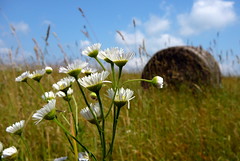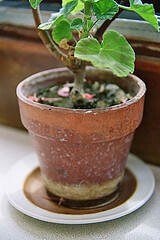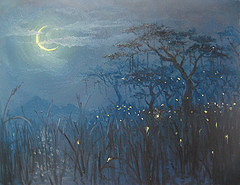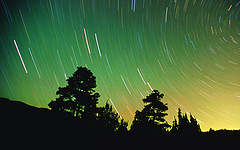 The Mystic's Christmasby John Greenleaf Whittier
The Mystic's Christmasby John Greenleaf Whittier
"All hail!" the bells of Christmas rang,
"All hail!" the monks at Christmas sang,
The merry monks who kept with cheer
The gladdest day of all their year.
But still apart, unmoved thereat,
A pious elder brother sat
Silent, in his accustomed place,
With God's sweet peace upon his face.
"Why sitt'st thou thus?" his brethren cried,
"It is the blessed Christmas-tide;
The Christmas lights are all aglow,
The sacred lilies bud and blow.
"Above our heads the joy-bells ring,
Without the happy children sing,
And all God's creatures hail the morn
On which the holy Christ was born.
"Rejoice with us; no more rebuke
Our gladness with thy quiet look."
The gray monk answered, "Keep, I pray,
Even as ye list, the Lord's birthday.
"Let heathen Yule fires flicker red
Where thronged refectory feasts are spread;
With mystery-play and masque and mime
And wait-songs speed the holy time!
"The blindest faith may haply save;
The Lord accepts the things we have;
And reverence, howsoe'er it strays,
May find at last the shining ways.
"They needs must grope who cannot see,
The blade before the ear must be;
As ye are feeling I have felt,
And where ye dwell I too have dwelt.
"But now, beyond the things of sense,
Beyond occasions and events,
I know, through God's exceeding grace,
Release from form and time and space.
"I listen, from no mortal tongue,
To hear the song the angels sung;
And wait within myself to know
The Christmas lilies bud and blow.
"The outward symbols disappear
From him whose inward sight is clear;
And small must be the choice of days
To him who fills them all with praise!
"Keep while you need it, brothers mine,
With honest seal your Christmas sign,
But judge not him who every morn
Feels in his heart the Lord Christ born!"
 (photo courtesy of flickr user "mrittenhouse")A song I've been listening to recently.The Trumpet Childby Over the Rhine
(photo courtesy of flickr user "mrittenhouse")A song I've been listening to recently.The Trumpet Childby Over the Rhine
The trumpet child will blow his horn
Will blast the sky till it’s reborn
With Gabriel’s power and Satchmo’s grace
He will surprise the human race
The trumpet he will use to blow
Is being fashioned out of fire
The mouthpiece is a glowing coal
The bell a burst of wild desire
The trumpet child will riff on love
Thelonious notes from up above
He’ll improvise a kingdom come
Accompanied by a different drum
The trumpet child will banquet here
Until the lost are truly found
A thousand days, a thousand years
Nobody knows for sure how long
The rich forget about their gold
The meek and mild are strangely bold
A lion lies beside a lamb
And licks a murderer’s outstretched hand
The trumpet child will lift a glass
His bride now leaning in at last
His final aim to fill with joy
The earth that man all but destroyed
 (photo courtesy of flickr user "Vangral")Song for a Winter's Night
(photo courtesy of flickr user "Vangral")Song for a Winter's Night
by Sarah McLachlan
the lamp is burning low upon my tabletop
the snow is softly falling
the air is still within the silence of my room
i hear your voice softly calling
if i could only have you near
to breathe a sigh or two
i would be happy just to hold the hands i love
upon this winter's night with you
the smoke is rising in the shadows overhead
my glass is almost empty
i read again between the lines upon the page
the words of love you sent me
if i could know within my heart
that you were lonely too
i would be happy just to hold the hands i love
upon this winter's night with you
the fire is dying now, the lamp is growing dim
the shades of night are lifting
the morning light steals across my windowpane
where webs of snow are drifting
if i could only have you near
to breathe a sigh or two
i would be happy just to hold the hands i love
and to be once again with you
to be once again with you
 Loket, Czech Republic, October 2007
Loket, Czech Republic, October 2007
Always the Peace of the Trainalways the peace of the train
before the screech and the rush
of the disbanding, demanding
head counts, rendezvous;
before anticipation of the destination
becomes the fruit of the here and now
when your common ground
is the earth rolling out
from under you and all of them
all breathe the same air
all hear the music of the sway of the rails
always the peace of the train
after tears and the drying of tears
the accomplishment, abandonment,
whatever purpose fulfilled
after satisfaction of the obligation
dissolves in the eyes of the homeward bound
when your common ground
is the earth rolling out
from under you and all of them
all breathe the same air
all hear the music of the sway of the rails
always the peace of the train
11.18.07
c.l.l.
 (photo courtesy of flickr user Peter Erik Forsberg)Novemberby Walter de la Mare
(photo courtesy of flickr user Peter Erik Forsberg)Novemberby Walter de la Mare
There is wind where the rose was,
Cold rain where sweet grass was,
And clouds like sheep
Stream o'er the steep
Grey skies where the lark was.
Nought warm where your hand was,
Nought gold where your hair was,
But phantom, forlorn,
Beneath the thorn,
Your ghost where your face was.
Cold wind where your voice was,
Tears, tears where my heart was,
And ever with me,
Child, ever with me,
Silence where hope was.
 (photo courtesy of flickr user "M. Gruber")Moving Forwardby Rainer Maria Rilke
(photo courtesy of flickr user "M. Gruber")Moving Forwardby Rainer Maria Rilke
The deep parts of my life pour onward,
as if the river shores were opening out.
It seems that things are more like me now,
That I can see farther into paintings.
I feel closer to what language can't reach.
With my senses, as with birds, I climb
into the windy heaven, out of the oak,
in the ponds broken off from the sky
my falling sinks, as if standing on fishes.
If someone could explain why the first stanza of this poem is being attributed to Sylvia Plath on several credible websites, I'd be happy to know. I think Rossetti is a safer bet.
A Better Resurrection
by Christina Rossetti
I have no wit, no words, no tears;
My heart within me like a stone
Is numb'd too much for hopes or fears;
Look right, look left, I dwell alone;
I lift mine eyes, but dimm'd with grief
No everlasting hills I see;
My life is in the falling leaf:
O Jesus, quicken me.
My life is like a faded leaf,
My harvest dwindled to a husk:
Truly my life is void and brief
And tedious in the barren dusk;
My life is like a frozen thing,
No bud nor greenness can I see:
Yet rise it shall--the sap of Spring;
O Jesus, rise in me.
My life is like a broken bowl,
A broken bowl that cannot hold
One drop of water for my soul
Or cordial in the searching cold;
Cast in the fire the perish'd thing;
Melt and remould it, till it be
A royal cup for Him, my King:
O Jesus, drink of me
 photo courtesy of flickr user "tavopp"Dancing Around Youdancing around you like a child
photo courtesy of flickr user "tavopp"Dancing Around Youdancing around you like a child
around a flame
around a bubble
everything you could mean
is too fragile still, dangerous,
and silent.
dancing around you like a child
in the music
in the hope
everything you could mean
is the falsetto note
that turns my heart
into a ringing well.
dancing around you like a child
through the sunrise
through the wet laundry
everything you could mean
runs like fresh water
into a cold glass to have
and to hold.
c.l.l.
9.3.07
by Sara Teasdale
No one worth possessing
Can be quite possessed;
Lay that on your heart,
My young angry dear;
This truth, this hard and precious stone,
Lay it on your hot cheek,
Let it hide your tear.
Hold it like a crystal
When you are alone
And gaze in the depths of the icy stone.
Long, look long and you will be blessed:
No one worth possessing
Can be quite possessed.
 c.l.l., june 2007, potter county, pennsylvania
c.l.l., june 2007, potter county, pennsylvania
Canto 12 of "Flare" by Mary Oliver.When loneliness comes stalking, go into the fields, consider
the orderliness of the world. Notice
something you have never noticed before,
like the tambourine sound of the snow-cricket
whose pale green body is no longer than your thumb.
Stare hard at the hummingbird, in the summer rain,
shaking the water-sparks from its wings.
Let grief be your sister, she will whether or no.
Rise up from the stump of sorrow, and be green also,
like the diligent leaves.
A lifetime isn't long enough for the beauty of this world
and the responsibilities of your life.
Scatter your flowers over the graves, and walk away.
Be good-natured and untidy in your exuberance.
In the glare of your mind, be modest.
And beholden to what is tactile, and thrilling.
Live with the beetle, and the wind.
This is the dark bread of the poem.
This is the dark and nourishing bread of the poem.
by William Bradbury and Edward MoteMy hope is built on nothing less
than Jesus' blood and righteousness;
I dare not trust the sweetest frame,
but wholly lean on Jesus' name.
On Christ the solid rock I stand;
all other ground is sinking sand;
all other ground is sinking sand.
When darkness seems to hide his face,
I rest on his unchanging grace.
In every high and stormy gale,
my anchor holds within the vale.
His oath, his covenant, his blood
support me in the whelming flood.
When all around my soul gives way,
he then is all my hope and stay.
When he shall come with trumpet sound,
O may I then in him be found,
dressed in his righteousness alone,
faultless to stand before the throne.
On Christ the solid rock I stand;
all other ground is sinking sand;
all other ground is sinking sand.
 (photo courtesy of flickr user "lanier67")This poem was recently referenced by a friend of mine on her blog, and I immediately fell in love with it. It's a joy to find the rare poem that deals with joy with the same zeal and precision as usually describes pain and sorrow. It takes effort to find happiness, because it usually means looking beyond ourselves, but how sweet the reward when we do.
(photo courtesy of flickr user "lanier67")This poem was recently referenced by a friend of mine on her blog, and I immediately fell in love with it. It's a joy to find the rare poem that deals with joy with the same zeal and precision as usually describes pain and sorrow. It takes effort to find happiness, because it usually means looking beyond ourselves, but how sweet the reward when we do.
Happiness
by Jane Kenyon
There’s just no accounting for happiness,
or the way it turns up like a prodigal
who comes back to the dust at your feet
having squandered a fortune far away.
And how can you not forgive?
You make a feast in honor of what
was lost, and take from its place the finest
garment, which you saved for an occasion
you could not imagine, and you weep night and day
to know that you were not abandoned,
that happiness saved its most extreme form
for you alone.
No, happiness is the uncle you never
knew about, who flies a single-engine plane
onto the grassy landing strip, hitchhikes
into town, and inquires at every door
until he finds you asleep midafternoon
as you so often are during the unmerciful
hours of your despair.
It comes to the monk in his cell.
It comes to the woman sweeping the street
with a birch broom, to the child
whose mother has passed out from drink.
It comes to the lover, to the dog chewing
a sock, to the pusher, to the basketmaker,
and to the clerk stacking cans of carrots
in the night.
It even comes to the boulder
in the perpetual shade of pine barrens,
to rain falling on the open sea,
to the wineglass, weary of holding wine.
I've read this through only once, but its use of language and meter captivated me. Enjoy. (Found on Poets.org.)
Joseph Cornell, With Box
by Michael Dumanis
World harbors much I'd like to fit inside
that the parameters preclude me from.
I'm the desire to have had a say.
I'm the desire to be left alone
amid brochures for Europe's best hotels
behind a locked door on Utopia Parkway,
where Brother, crippled, rides his chariot,
where Mother's all dressed up and going nowhere.
Together, sotto voce, we count hours,
fuss over newsprint, water down the wine.
When I was shorter, we were all divine.
When I was shorter, I was infinite
and felt less fear of being understood.
I am the fear of being understood.
I am the modest Joe who hems and haws
at blond cashiers ensconced in ticket booths.
Lacking the words to offer her the flowers
I'd spent a fortnight locating the words
to offer her, I threw the flowers at her.
As penance, I entrenched you, Doll, in wood.
Through your shaved bark and twigs, you stared at me.
Being a woman was out of the question.
Being a question caused women to wonder.
How unrestrained you must feel, Wind and Water.
You are the obligation, Box, to harbor
each disarray and ghost. I am the author,
the authored by. I am a plaything of.
Who makes who Spectacle. Who gives whom Order.
My father was a man who lived and died.
He would commute from Nyack to New York.
The woolen business had its ups and downs.
How unrestrained you've become, Cage and Coffin.
There is an order to each spectacle.
You are the obligation, Wind, to sunder
this relic of. Am reliquary for
the off-white light of January morning.
Have seen you, Fairies, in your apricot
and chestnut negligees invade the mirror,
tiptoe on marbles, vanish from the scene.
Am reliquary for what World has seen.
I'm the ballet of wingspan, the cracked mirror.
Canary's coffin. Sunshine breaking through.
I'm on a Lisel Mueller kick. I've recently discovered more of her work, and I really, really like it. She is one of the poets to whose talents I aspire. TobyWhat the Dog Perhaps Hearsby Lisel Mueller
TobyWhat the Dog Perhaps Hearsby Lisel Mueller
If an inaudible whistle
blown between our lips
can send him home to us,
then silence is perhaps
the sound of spiders breathing
and roots mining the earth;
it may be asparagus heaving,
headfirst, into the light
and the long brown sound
of cracked cups, when it happens.
We would like to ask the dog
if there is a continuous whir
because the child in the house
keeps growing, if the snake
really stretches full length
without a click and the sun
breaks through clouds without
a decibel of effort,
whether in autumn, when the trees
dry up their wells, there isn't a shudder
too high for us to hear.
What is it like up there
above the shut-off level
of our simple ears?
For us there was no birth cry,
the newborn bird is suddenly here,
the egg broken, the nest alive,
and we heard nothing when the world changed.
I keep books of poetry as close to me as I keep my Bible. Always on my nightstand, two Bibles, one anthology. One Bible, two anthologies. Always. I don't think it's wrong or even sacrilegious. I think it was intended.
This poem might do something to explain why. (photo courtesy of flickr user pretorious_photography)Moon Fishingby Lisel Mueller
(photo courtesy of flickr user pretorious_photography)Moon Fishingby Lisel Mueller
When the moon was full they came to the water,
some with pitchforks, some with rakes,
some with sieves and ladles,
and one with a silver cup.
And they fished till a traveler passed them and said,
"Fools,
to catch the moon you must let your women
spread their hair on the water--
even the wily moon will leap to that bobbing
net of shimmering threads,
gasp and flop till its silver scales
lie black and still at your feet."
And they fished with the hair of their women
till a traveler passed them and said,
"Fools,
do you think the moon is caught lightly,
with glitter and silk threads?
You must cut out your hearts and bait your hooks
with those dark animals;
what matter you lose your hearts to reel in your dream?"
And they fished with their tight, hot hearts
till a traveler passed them and said,
"Fools,
what good is the moon to a heartless man?
Put back your hearts and get on your knees
and drink as you never have,
until your throats are coated with silver
and your voices ring like bells."
And they fished with their lips and tongues
until the water was gone
and the moon had slipped away
in the soft, bottomless mud.
 Hopeby Lisel Mueller
Hopeby Lisel Mueller
It hovers in dark corners
before the lights are turned on,
it shakes sleep from its eyes
and drops from mushroom gills,
it explodes in the starry heads
of dandelions turned sages,
it sticks to the wings of green angels
that sail from the tops of maples.
It sprouts in each occluded eye
of the many-eyed potato,
it lives in each earthworm segment
surviving cruelty,
it is the motion that runs
from the eyes to the tail of a dog,
it is the mouth that inflates the lungs
of the child that has just been born.
It is the singular gift
we cannot destroy in ourselves,
the argument that refutes death,
the genius that invents the future,
all we know of God.
It is the serum which makes us swear
not to betray one another;
it is in this poem, trying to speak.
__________________________________________
it glistens on the petals of the pansies in the snow-frosted greenhouse...
Rarely are poems so joyously beautiful as those written about love. Only something we do not understand could bring us so much feeling. Here are two lovely ones I found. Happy Valentine's Day
 When You Are Oldby W.B. Yeats
When You Are Oldby W.B. Yeats
When you are old and grey and full of sleep,
And nodding by the fire, take down this book,
And slowly read, and dream of the soft look
Your eyes had once, and of their shadows deep;
How many loved your moments of glad grace,
And loved your beauty with love false or true,
But one man loved the pilgrim soul in you,
And loved the sorrows of your changing face;
And bending down beside the glowing bars,
Murmur, a little sadly, how Love fled
And paced upon the mountains overhead
And hid his face amid a crowd of stars.A Birthdayby Christina Rossetti
My heart is like a singing bird
Whose nest is in a water'd shoot;
My heart is like an apple-tree
Whose boughs are bent with thick-set fruit;
My heart is like a rainbow shell
That paddles in a halcyon sea;
My heart is gladder than all these,
Because my love is come to me.
Raise me a daïs of silk and down;
Hang it with vair and purple dyes;
Carve it in doves and pomegranates,
And peacocks with a hundred eyes;
Work it in gold and silver grapes,
In leaves and silver fleurs-de-lys;
Because the birthday of my life
Is come, my love is come to me.
Two poems today by Theodore Roethke. The second one is the poem that I really want to post, because it's giving me life and breath these days. I have, however, posted it previously on this blog, and since I don't like reruns, I'm posting a new Roethke poem to accompany it. Enjoy.
 (photo courtesy of flickr user cath9)The Geranium
(photo courtesy of flickr user cath9)The Geranium
by Theodore Roethke
When I put her out, once, by the garbage pail,
She looked so limp and bedraggled,
So foolish and trusting, like a sick poodle,
Or a wizened aster in late September,
I brought her back in again
For a new routine--
Vitamins, water, and whatever
Sustenance seemed sensible
At the time: she'd lived
So long on gin, bobbie pins, half-smoked cigars, dead beer,
Her shriveled petals falling
On the faded carpet, the stale
Steak grease stuck to her fuzzy leaves.
(Dried-out, she creaked like a tulip.)
The things she endured!--
The dumb dames shrieking half the night
Or the two of us, alone, both seedy,
Me breathing booze at her,
She leaning out of her pot toward the window.
Near the end, she seemed almost to hear me--
And that was scary--
So when that snuffling cretin of a maid
Threw her, pot and all, into the trash-can,
I said nothing.
But I sacked the presumptuous hag the next week,
I was that lonely.
The Waking
by Theodore Roethke
I wake to sleep, and take my waking slow.
I feel my fate in what I cannot fear.
I learn by going where I have to go.
We think by feeling. What is there to know?
I hear my being dance from ear to ear.
I wake to sleep, and take my waking slow.
Of those so close beside me, which are you?
God bless the Ground! I shall walk softly there,
And learn by going where I have to go.
Light takes the Tree; but who can tell us how?
The lowly worm climbs up a winding stair;
I wake to sleep, and take my waking slow.
Great Nature has another thing to do
To you and me, so take the lively air,
And, lovely, learn by going where to go.
This shaking keeps me steady. I should know.
What falls away is always. And is near.
I wake to sleep, and take my waking slow.
I learn by going where I have to go.
 (photo courtesy of flickr user "Chosetec")An excerpt from a poem for someone who I have never met but who I know got married today to her best friend.
(photo courtesy of flickr user "Chosetec")An excerpt from a poem for someone who I have never met but who I know got married today to her best friend.
Excerpt from:
When A Woman Loves A Man
by David Lehman
When a woman loves a man, she wants him to meet her at the
airport in a foreign country with a jeep.
When a man loves a woman he's there. He doesn't complain that
she's two hours late
and there's nothing in the refrigerator.
When a woman loves a man, she wants to stay awake.
She's like a child crying
at nightfall because she didn't want the day to end.
When a man loves a woman, he watches her sleep, thinking:
as midnight to the moon is sleep to the beloved.
A thousand fireflies wink at him.
The frogs sound like the string section
of the orchestra warming up.
The stars dangle down like earrings the shape of grapes.
 (photo courtesy of flickr user "Fort Photo")Ignorant Before the Heavens Of My Life
(photo courtesy of flickr user "Fort Photo")Ignorant Before the Heavens Of My Life
by Rainer Maria Rilke
Ignorant before the heavens of my life,
I stand and gaze in wonder. Oh the vastness
of the stars. Their rising and descent. How still.
As if I didn't exist. Do I have any
share in this? Have I somehow dispensed with
their pure effect? Does my blood's ebb and flow
change with their changes? Let me put aside
every desire, every relationship
except this one, so that my heart grows used to
its farthest spaces. Better that it live
fully aware, in the terror of its stars, than
as if protected, soothed by what is near.















